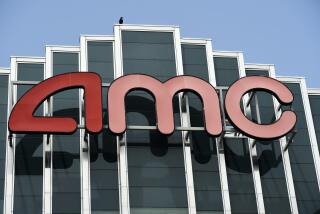American Medical International Profit Dives in Quarter : Hike in Malpractice Insurance Reserve, Cost of Canceling Office Leases Slash Net to $440,000
- Share via
American Medical International reported Monday that its earnings plummeted in the latest quarter to $440,000 from $39.2 million in the same period of the previous year. The hospital management company blamed most of the decline on one-time expenses of $13 million to bolster its malpractice insurance reserve and $11 million to cancel office leases.
The financial results, for AMI’s first fiscal quarter ended Nov. 30, were reported on the same day that Richard A. Gilleland was installed as chief executive of the Beverly Hills-based company. Gilleland succeeds Royce Diener, who temporarily assumed the post after AMI’s board forced Walter L. Weisman, the former chairman and chief executive, to resign Aug. 30.
Industry analysts said the company apparently chose to take the one-time charges at this time to put AMI on a better financial footing for the beginning of Gilleland’s term as chief executive. Gilleland is expected to be elected chairman at the company’s annual meeting Thursday.
“Any new chief executive ought to have the advantage of a honeymoon,” said John Hindelong, an analyst at Smith Barney, Harris Upham & Co. in New York. “A new chief executive is hired with a mandate for making the financial situation stronger.” Hindelong said the company has strong cash flow and its earnings should be “satisfactory” in the future, given a rising demand for its services.
Rae Alperstein, an analyst at Bateman Eichler, Hill Richards Inc. in Los Angeles, said the one-time charges were prudent considering the leadership change at AMI. “You increase the reserves and take the expenses to be more conservative, especially when you have a new executive coming in,” Alperstein said. “You pay it off now rather than stringing it out over a period of time. . . . You wipe the slate clean for new management.”
AMI is self-insured for malpractice liability, and its reserve was adequate for existing claims, said Mick Taylor, a spokesman for AMI. But the company chose to shore up the reserve because the industry will probably face an increase in the number of malpractice lawsuits, he said.
“We’ve always been conservative in the reserve area, and this is in line with that approach,” Taylor said. “It’s driven by the fact that society is becoming more litigious.” He denied that the company had been hit by any significant malpractice judgments that would have forced the increase in the insurance reserve.
Taylor said the $11-million charge to cancel office leases covers an ongoing consolidation that will cut AMI’s total office space by more than 10%. The decision to close five locations stems partly from AMI’s decision in September to lay off about 300 of its 2,000 employees as part of a cost-cutting plan.
The plan was launched by Weisman in 1986, when the company reported a loss of $97.3 million for the fiscal year. The pace of cost-cutting accelerated after a major AMI investor--Dr. M. Lee Pearce of Miami--began to criticize AMI management last January. At that time, Pearce filed a Securities and Exchange Commission document characterizing AMI’s performance as lackluster and outlined a restructuring program that called for staff reductions and the sale of underperforming assets.
AMI’s board withdrew their support for Weisman after Pearce and three other large investors demanded that a new chief executive be appointed. AMI executives said Weisman was pressured into resigning partly because of delays in implementing a plan to sell 37 of its 85 U.S. hospitals to its employees. The facilities were sold for $830 million to an employee stock ownership plan--Dallas-based Epic Healthcare Inc.--on Sept. 30, leaving AMI with 69 hospitals worldwide.
The financial results announced Monday were the first from the now-leaner AMI. The company reported revenue of $646.8 million, compared to $741.6 million during the first quarter of the previous year. Excluding the hospitals that are now part of Epic Healthcare, AMI would have reported revenue of $582 million for the year-ago period.
AMI also announced Monday that it approved a plan to repurchase up to $25 million of its common stock and up to $50 million of its bonds. The company spent about $167 million to buy back about 10 million shares in the first quarter as part of an effort to boost the value of its stock.
More to Read
Inside the business of entertainment
The Wide Shot brings you news, analysis and insights on everything from streaming wars to production — and what it all means for the future.
You may occasionally receive promotional content from the Los Angeles Times.










